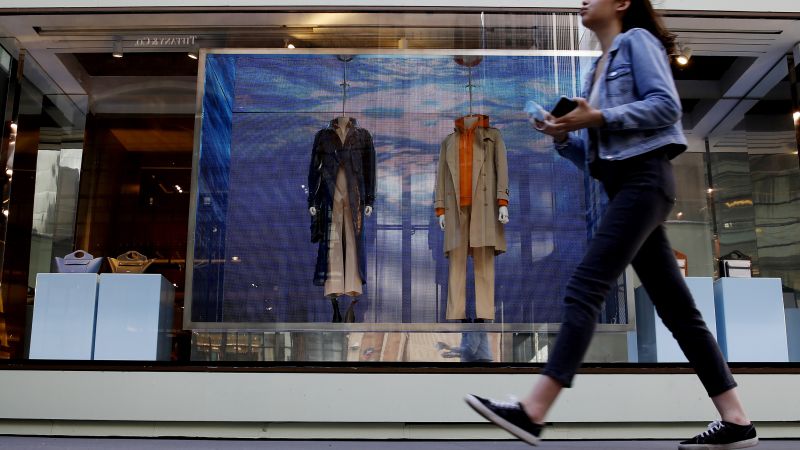A version of this story first appeared in CNN Business’ Before the Bell newsletter. Not a subscriber? You can sign up right here. You can listen to an audio version of the newsletter by clicking the same link.
Americans with deep pockets have played a growing role in powering the US economy with their spending. But their days of splurging like there’s no tomorrow might be coming to an end.
US household wealth surged in recent years, despite the scourge of high inflation and the Federal Reserve’s bitter medicine of elevated borrowing costs to rein in price increases.
A robust stock market coupled with rising home values have boosted Americans’ wealth from 2019 through 2022, according to a Federal Reserve report on household finances. That increase is known as “the wealth effect,” and it has continued to shore up Americans’ finances as stocks shatter records and high bond yields beef up savings accounts.
Plus, Americans who locked in a low mortgage rate before the Fed began to hike interest rates in 2022 and have decided to stay put have been shielded from the effects of high mortgage rates.
Put together, that means many consumers have not only been able to withstand inflation, to a degree, but they’ve also been able to spend on travel, concerts and big-ticket items. US economic growth accelerated at a brisk pace in 2023, largely thanks to the US consumer.
And it’s Americans older than 54 who hold the vast amount of household wealth in the US, more than 70%, according to Fed data.
But the economy’s momentum has slowed a bit recently with figures on employment and retail spending for April coming in weaker than expected. While the broader economy remains healthy, including the job market with sub-4% unemployment, there are signs that an important corner has been turned. The shifting behavior of wealthy Americans is one of them.
“It’s well known that the lowest income consumer is really struggling with inflation, but from a purely economic standpoint, it is the higher quintiles of earners that do the most spending,” Nanette Abuhoff Jacobson, global investment strategist at Hartford Funds, told CNN.
There’s been some evidence of wealthy Americans growing cautious in the latest round of company earnings results.
British luxury retailer Burberry reported last week that its profits plummeted by 40% in the budget year ending in late March. Sales in the Americas dropped off by 12% over the year.
“Executing our plan against a backdrop of slowing luxury demand has been challenging,” Jonathan Akeroyd, Burberry’s chief executive, said in a statement.
LVMH Moët Hennessy Louis Vuitton reported in its latest earnings results last month that demand for high-end liquors has declined sharply in the US, leading to high inventory levels for the French luxury conglomerate’s alcoholic beverages division.
Walmart, which traditionally caters to lower and middle-income Americans, even reported last week that its gains last quarter were “primarily driven by upper-income households,” or those making more than $100,000 a year.
But the broader picture isn’t all doom and gloom. It’s been mixed: Royal Caribbean Cruises topped expectations for its first-quarter earnings results thanks to solid bookings and robust onboard spending. Demand for cruises, arguably an activity for the well-off, shows there isn’t this mass retrenchment from rich Americans just yet.
But some are thinking twice before swiping that card or clicking on the purchase button.
Consumers overall have become more price sensitive, according to various examples in the Fed’s periodic collection of anecdotes known as the Beige Book.
“When we talk to CEOs and CFOs, they’re saying that people are pushing back, so companies now aren’t feeling as comfortable pushing through price increases,” said Jacobson of Hartford Funds.
“And company earnings in the consumer discretionary area are ones to continue to watch for signs of consumer stress.”
Ariel Barnes plunged into a credit card debt spiral in college, and a decade later she’s yet to escape.
Barnes, a manager of gift processing at Jackson State University, has maxed out seven credit cards and is struggling to make minimum payments on $30,000 of credit card debt.
“The interest is so high that it’s hard to get out of it,” Barnes, who is 28 years old and lives in Jackson, Mississippi, told CNN in a phone interview on Thursday.
Barnes is hardly alone.
Roughly one in seven (15.3%) Gen Z credit card borrowers have maxed out their credit cards, according to new research from the Federal Reserve Bank of New York. (The NY Fed defined Gen Z as borrowers born between 1995 and 2011, though others mark the cut off as 1996 or 1997).
By comparison, just 4.8% of Baby Boomer borrowers and 9.6% of Gen Xers have maxed out their credit cards, which can be a sign of a severely tight cash-flow problem, my colleague Matt Egan reports.
Read more here.
Monday: Earnings from Palo Alto Networks, Trip.com and Zoom. Federal Reserve officials Michael Barr, Christopher Waller, Philip Jefferson and Raphael Bostic deliver remarks.
Tuesday: Earnings from Lowe’s, AutoZone, Macy’s and Urban Outfitters. Federal Reserve officials Christopher Waller, John Williams, Raphael Bostic, Michael Barr, Loretta Mester and Susan Collins deliver remarks.
Wednesday: Earnings from NVIDIA, TJX, Target, Guess?, Petco, Children’s Place and Red Robin. The UK’s Office for National Statistics releases April inflation data. The National Association of Realtors reports April home sales. The Federal Reserve release minutes from its May policymaking meeting.
Thursday: Earnings from Intuit, Medtronic, Workday, Ross, Dollar Tree, Burlington, Ralph Lauren, Build-A-Bear Workshop and 23andMe. The US Labor Department reports the number of new applications for jobless benefits in the week ending May 18. The Chicago Fed releases its National Activity Index for April. S&P Global releases May business surveys gauging economic activity in the US manufacturing and services sectors. The US Commerce Department reports new home sales in April. Atlanta Fed President Raphael Bostic delivers remarks.
Friday: Earnings from Booz Allen Hamilton, Buckle and Big Lots. The US Commerce Department reports new orders for durable goods in April. Fed Governor Christopher Waller delivers remarks. The University of Michigan releases its final reading of consumer sentiment in May.
Read the full article here




